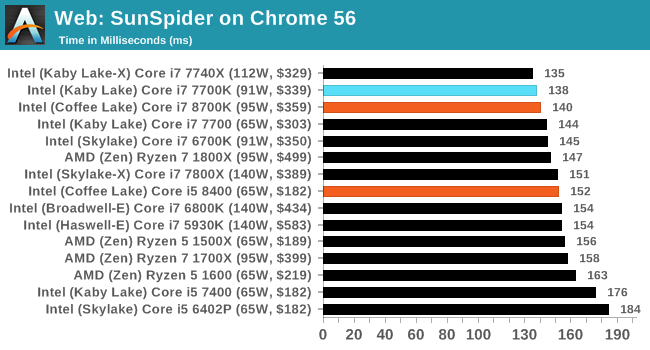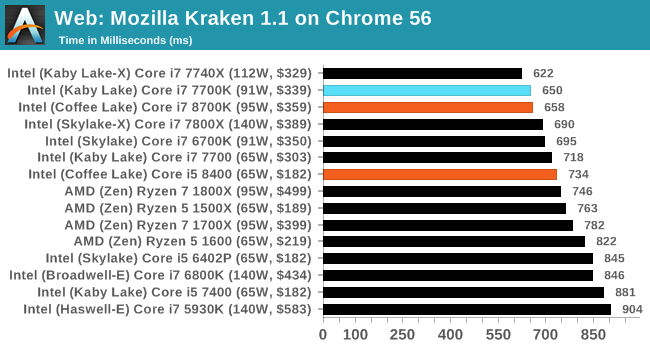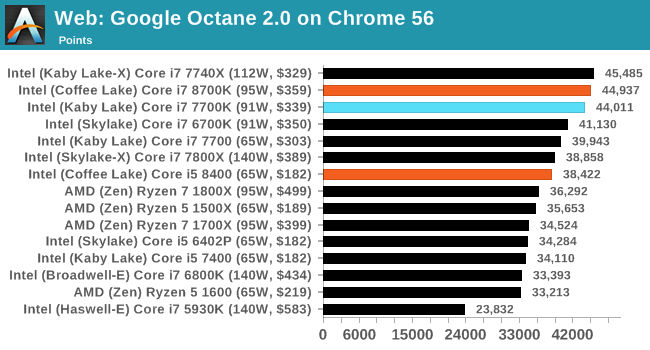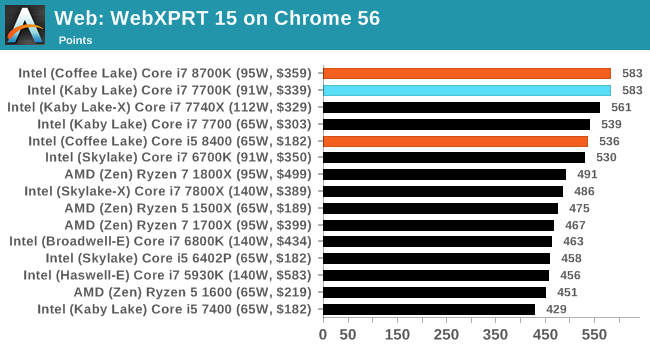The AnandTech Coffee Lake Review: Initial Numbers on the Core i7-8700K and Core i5-8400
by Ian Cutress on October 5, 2017 9:00 AM EST- Posted in
- CPUs
- Intel
- Core i5
- Core i7
- Core i3
- 14nm
- Coffee Lake
- 14++
- Hex-Core
- Hyperthreading
Benchmarking Performance: CPU Web Tests
One of the issues when running web-based tests is the nature of modern browsers to automatically install updates. This means any sustained period of benchmarking will invariably fall foul of the 'it's updated beyond the state of comparison' rule, especially when browsers will update if you give them half a second to think about it. Despite this, we were able to find a series of commands to create an un-updatable version of Chrome 56 for our 2017 test suite. While this means we might not be on the bleeding edge of the latest browser, it makes the scores between CPUs comparable.
All of our benchmark results can also be found in our benchmark engine, Bench.
SunSpider 1.0.2: link
The oldest web-based benchmark in this portion of our test is SunSpider. This is a very basic javascript algorithm tool, and ends up being more a measure of IPC and latency than anything else, with most high-performance CPUs scoring around about the same. The basic test is looped 10 times and the average taken. We run the basic test 4 times.

Mozilla Kraken 1.1: link
Kraken is another Javascript based benchmark, using the same test harness as SunSpider, but focusing on more stringent real-world use cases and libraries, such as audio processing and image filters. Again, the basic test is looped ten times, and we run the basic test four times.

Google Octane 2.0: link
Along with Mozilla, as Google is a major browser developer, having peak JS performance is typically a critical asset when comparing against the other OS developers. In the same way that SunSpider is a very early JS benchmark, and Kraken is a bit newer, Octane aims to be more relevant to real workloads, especially in power constrained devices such as smartphones and tablets.

WebXPRT 2015: link
While the previous three benchmarks do calculations in the background and represent a score, WebXPRT is designed to be a better interpretation of visual workloads that a professional user might have, such as browser based applications, graphing, image editing, sort/analysis, scientific analysis and financial tools.











222 Comments
View All Comments
madwolfa - Thursday, October 5, 2017 - link
How in the world 8400 is so significantly faster than 7700K/8700K in all ROTR 1080p benchmarks?neo_1221 - Thursday, October 5, 2017 - link
Maybe resource contention on the hyper-threaded parts? It is odd, but I'm very impressed with that 8400. For most workloads it easily hangs out with the $300+ CPUs.risa2000 - Friday, October 6, 2017 - link
Not only RoTR but also in GTAV. I hope there is an explanation the guys at AT will figure out. If it was the congestion of the threads (as suggested above) then all Ryzen chips should be even worse, but they are not.mapesdhs - Friday, October 6, 2017 - link
According to Ian, RoTR has pure quad-core optimisations present in the engine.nsaklas - Thursday, October 5, 2017 - link
Good info Ian, thank you. Am I the only one who's terribly disappointed by this release?! I've been holding out for this moment to upgrade and what I can gather from the benchmarks is that this will have no noticeable improvement on performance for most applications vs. the last 2 gen's of CPUs....xyvyx2 - Friday, October 6, 2017 - link
yeah.. when I saw these numbers, I figured I'd go back to waiting for 10nm or Ryzen 2. But Techreport's comparison a) used a 1080ti, which I also have b) included my current cpu, the 4790k. The results were far more pronounced and closer to what I'd hoped...I'm mostly baffled by the i5-8400... if it's just 6 cores and it did so much better than the 8700k at a lower turbo clock, on those thread-crippled games, would the new i7 have done better with HT disabled? Would it run cooler with only 6 threads?
limitedaccess - Thursday, October 5, 2017 - link
I'm wondering if you can provide information on what the uncore speeds are for the various Coffeelake SKUs?limitedaccess - Thursday, October 5, 2017 - link
For example would the 8700 and 8700k possibly differ in uncore speed?Ian Cutress - Saturday, October 7, 2017 - link
Usually not, though Intel doesn't provide this information for all the chips in the stack for various (unfathomable) reasons. We've asked before.mapesdhs - Tuesday, October 10, 2017 - link
Is it possible to use cache snooping and other methods to work out uncore speeds?